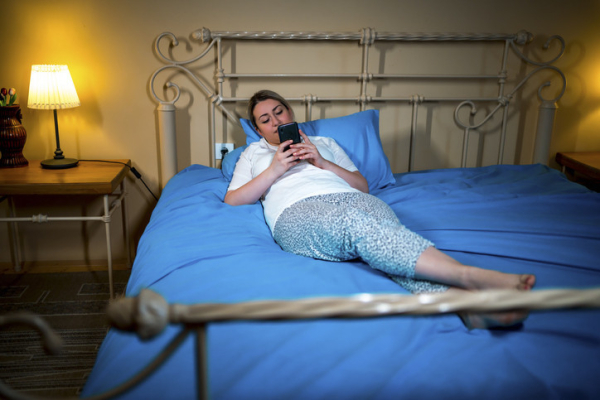Restful sleep is key for good health, and reluctance to sleep can have consequences.

A few years ago, the official Twitter account for Netflix sent out the following message: “Sleep is my greatest enemy.” This perfectly sums up the battle you might experience when you know that you should be in bed but avoid going. But the urge to stay awake may be affecting your health. Here’s why it’s time to rethink bedtime procrastination and take steps toward a healthier path.
What is bedtime procrastination?
Our highly-wired world jockeys to keep us engaged; there’s always one more episode to watch, another text to respond to, a few more social media apps to check out. Daily pressures and challenges can make it hard to carve out time for ourselves. Is it any surprise that many of us procrastinate about going to bed?
Nearly two decades ago, a group of researchers in Europe coined the term “bedtime procrastination” to describe someone who goes to bed later than planned, despite knowing that there will be negative consequences if they do. Their research showed that adults who procrastinated significantly about going to bed were more fatigued and slept less compared to those who did not procrastinate.
One key factor? Smartphone use: procrastinators use their devices for an average of almost 80 minutes before bed compared with 18 minutes for non-procrastinators.
Why does it matter?
Routinely getting less sleep than you need, or not getting sufficient good-quality sleep, is associated with many poor health outcomes, including cardiovascular issues like high blood pressure and heart problems, cognitive issues, and depression. Sleep is one of the three pillars of health, along with good nutrition and exercise. Yet encouraging restful sleep is often overlooked as a way to improve our physical and mental well-being.
What can you do If you struggle with bedtime procrastination?
Recently, researchers from the Republic of Korea piloted a small trial of a program to target bedtime procrastination. Their program focuses on improving motivation and changing behavior. During this preliminary study, 20 participants engaged in 50-minute sessions once weekly for three weeks, followed by a booster phone call. They reduced time spent procrastinating before bed by more than 60%, and reported fewer struggles with daytime sleepiness and insomnia.
Five promising takeaways may help you dial down bedtime procrastination:
- Figure out your motivation for a positive change. Bedtime procrastination wouldn’t occur if it didn’t have positive aspects — watching more TV, say, or enjoying the only quiet time you have in the day. However, you’re probably not tallying the costs of staying up later than you should. You’re experiencing the immediate gratification of being awake now, whereas the potential reward of feeling good in the morning if you go to bed now is a distant possibility, hours and hours away. Be honest with yourself about the pros and cons of bedtime procrastination and how you’ll feel the next day.
- Track your sleep patterns. Most likely, you don’t remember when you wanted to go to bed versus when you actually went to bed during the past few weeks. Writing this down for a week or two will help you understand if bedtime procrastination is a problem for you.
- Set a realistic goal. Let’s say you know that you need to be in bed by 11 pm to feel clear-headed and well the next morning. If you typically go to bed at 1 am, aiming for 11 pm every night is probably not realistic. Start by trying to move your bedtime back by 15 or 30 minutes. If that’s successful, keep the momentum going.
- Make a contract for change. One of the most powerful tools you can bring to the table is a promise to another person. It holds you accountable, and greatly increases the likelihood that you will follow through on making a change in your life. Have you ever wondered why you are more likely to go to the gym if you have a personal trainer? In this case, consider sharing your aims and actual results with a partner, parent, child, relative, friend, or coworker.
- Keep an eye out for barriers. As you act on changes, be mindful of the barriers you encounter. For example, you might find yourself feeling lonely at night, which drives you to use your smartphone more than you should to feel connected with others.
The bottom line
If you procrastinate about going to bed, you are not alone. Whether you feel like you never have enough time for yourself, or stay up too late on Sunday night because you dread your to-do list on Monday morning, your reluctance to sink into sleep is completely understandable. Occasional bedtime procrastination is a normal part of life unlikely to affect your health. However, if you find that consistent procrastination leads to getting less sleep than you need, consider trying strategies designed to curb the habit.
About the Author

Eric Zhou, PhD, Contributor
Eric Zhou, PhD, is an assistant professor at Harvard Medical School. His research focuses on how we can better understand and treat sleep disorders in both pediatric and adult populations, including those with chronic illnesses. Dr. … See Full Bio View all posts by Eric Zhou, PhD